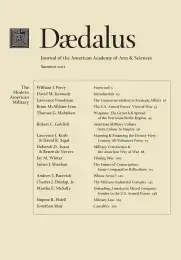American Military Culture from Colony to Empire
Until World War II, the peacetime Army’s primary job was not to be ready to fight instantly, but to provide a core of military expertise that would enable a wartime force of citizen-soldiers to be built up after war began. Wars were infrequent. Since the end of the Cold War, the Army has become a force that deploys and fights on a regular basis. The true citizen-soldier–who serves for only a few years and remains, at heart, a civilian–is no longer with us and is not likely to return in the foreseeable future, despite nostalgia for his passing. In the midst of a civilian society that is increasingly pacifistic, easygoing, and well adjusted, the Army (career and non-career soldiers alike) remains flinty, harshly results-oriented, and emotionally extreme. The inevitable civil-military gap has become a chasm.
In 1963, Theodore R. Fehrenbach published a magisterial, and in many places poetic, history of the Korean War. Nearly fifty years later, his book remains the seminal treatise on limited frontier wars and the American national psyche. Fehrenbach addressed the incompatibility of America’s changed strategic circumstances after World War II with the traditional American view of the purpose of an army and how it should be manned. For such limited wars, he maintained, the United States needed “legions”:
However repugnant the idea is to liberal societies, the man who will willingly defend the free world in the fringe areas is not the responsible citizen-soldier. The man who will go where his colors go, without asking, who will fight a phantom foe in jungle and mountain range, without counting, and who will suffer and die in the midst of incredible hardship, without complaint, is still what he always has been, from Imperial Rome to sceptered Britain to democratic America. He is the stuff of which legions are made.
His pride is in his colors and his regiment, his training hard and thorough and coldly realistic, to fit him . . .
